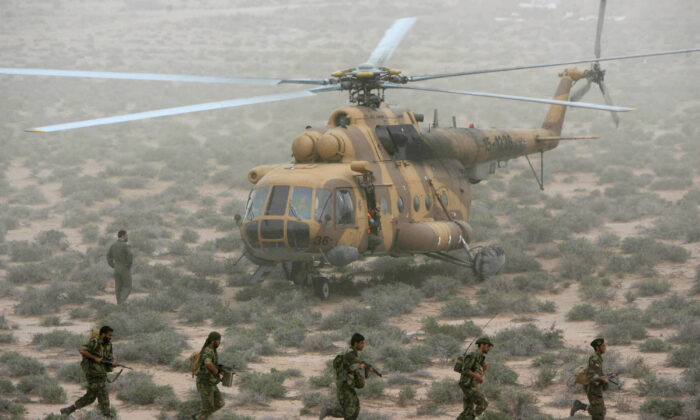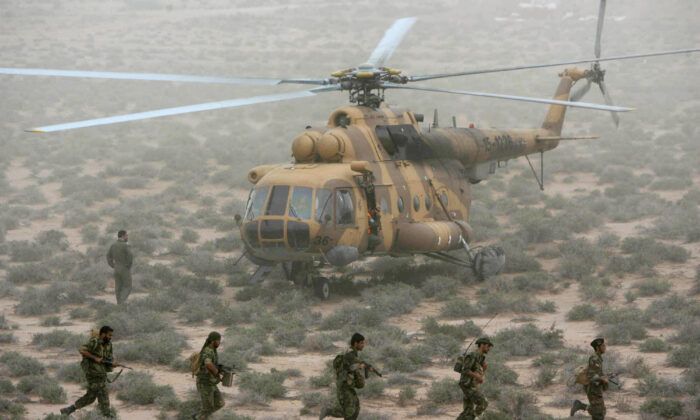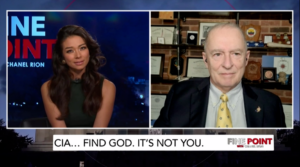
Iran’s elite Revolutionary Guard special forces participate in military manoeuvers at an undisclosed location near the Persian Gulf on April 3, 2006. (-/AFP via Getty Images)
Iran and China pose a serious threat to the United States, and for the past couple of years, Iran has increasingly aligned with China.
While both countries have had shared interests in working together in recent years, such cooperation has evolved into a more strategic partnership.
Over the past year, Iran has greatly increased the aggressiveness and scope of its attacks on the West. This has been widely reported to be a result of the increased sanctions imposed by President Donald Trump that have so badly damaged the Iranian economy. However, that’s only part of the story and probably isn’t the most important part.
Since President Jimmy Carter’s decision to impose sanctions against Iran for the first time, harsher sanctions have followed, by both the United States and the United Nations at various times since the 1970s. Those sanctions had a serious impact on the Iranian economy, similar to what we see today. However, only under the current circumstances has Iran reacted in a completely unique and particularly violent manner.
The hand of that violence is the Iranian Revolutionary Guard Corps (IRGC), which conducts intelligence activities, extraterritorial operations, and unconventional warfare. The Quds Force of the IRGC and its partner Hezbollah have the capacity to stage terrorist attacks worldwide, damaging the global economy, including the capacity to stage attacks inside the United States.
To respond to tough sanctions and to avoid complete economic meltdown, the Islamic republic has resorted to different tactics, including covert operations, orchestrated by the IRGC.
The attack against the Abqaiq crude processing plant, which has been blamed on Iran by the United States and some other countries, came immediately after the “Quartet” meeting between Saudi Arabia, the United Arab Emirates, Bahrain, and Egypt. These countries formed the core of the Saudi-led intervention in Yemen that was launched in 2015. The Abqaiq plant is the largest Saudi oil facility, and about half of its capacity was destroyed in the attack.
The alleged involvement of the Iranians in the Abqaiq site attack is a serious escalation between Iran, including its surrogates, and the Saudi-led Arab coalition. The attack is a textbook example of unconventional warfare.
Contrary to criticism about Trump being an irrational warmonger, he’s long been on the record as not liking overseas military incursions and may actually be deeply hesitant to consider military options. A recent example speaks for itself. In June, Trump called off the U.S. airstrike against Iran that had been planned as retaliation for the IRGC downing a U.S. drone near the Strait of Hormuz.
As a master of negotiation, Trump prefers to play to that strength. However, facing an implacable Iran that doesn’t want to negotiate and will probably choose to continue its covert unconventional warfare, the administration’s policy toward Iran appears to be ambiguous.
What’s even more concerning is that the Republican Party remains totally ineffective, and they gladly follow in the footsteps of the Democrats in political purgatory. The options they propose involve two opposing views. On the one hand, they seem to be willing to give a green light to the use of force. But on the other hand, they want to continue the so-called “leading from behind” policies of Trump’s predecessor.
If this confusion continues and causes the Saudis to pull out of Yemen, Iran will gladly fill the vacuum and expand its influence onto the Arabian Peninsula.
While the escalation between Iran and the Saudi-led coalition continues, the Democrats in the U.S. Congress decided to resist supporting the Saudi-led coalition fighting the Houthi rebels in Yemen by proposing an amendment to the annual defense spending bill to block U.S. military support. It passed in the House version of the bill. Sen. Bernie Sanders (I-Vt.) recently led a bipartisan effort to keep the amendment in the final version.
While Trump has been dealing with China, our greatest strategic threat and one of Iran’s most important backers, the IRGC has been free to conduct its own operations. The administration has been struggling as to how it should respond to this situation.
Following the clearly justified decision to withdraw from the Joint Comprehensive Plan of Action (JCPOA), better known as the Iran nuclear deal, it’s obvious that the regime in Tehran is not after any resolution that could alleviate U.S. concerns.
The European Union (EU) and leftist elements in the U.S. Senate who support Iran and the JCPOA deal for political gain or self-interest are backing a path that could lead to greater risks, violence, and economic chaos. Members of Congress who wish to end U.S. support for Saudi Arabia are missing the big picture. Their failure to grasp the dynamics and complexities of the Middle East could lead to Iranian hegemony in the region.
Having a consensus about their positions, China and Iran could collaborate in a number of areas to inflict damage on the United States. While focusing on Trump directly isn’t a viable option for China, stopping his reelection could present a window of opportunity.
Working together with Iran, China will try to influence elections in the United States to help a Democratic candidate be elected. Once they achieve that, then China will go back to business as usual, and Iran could get its unfair JCPOA deal back.
Brad Johnson is a retired CIA senior operations officer and a former chief of station. He is president of Americans for Intelligence Reform.
Views expressed in this article are the opinions of the author and do not necessarily reflect the views of The Epoch Times.




